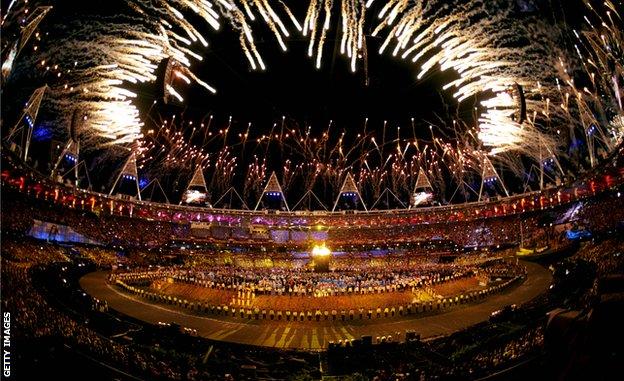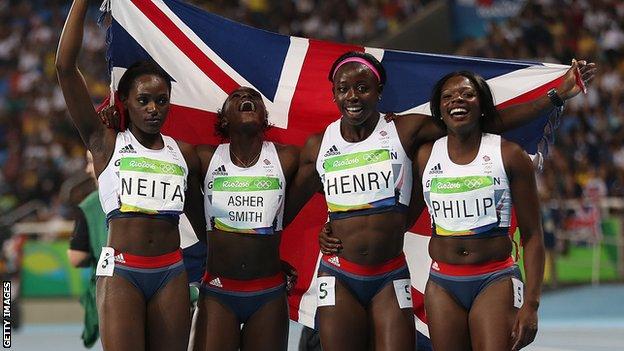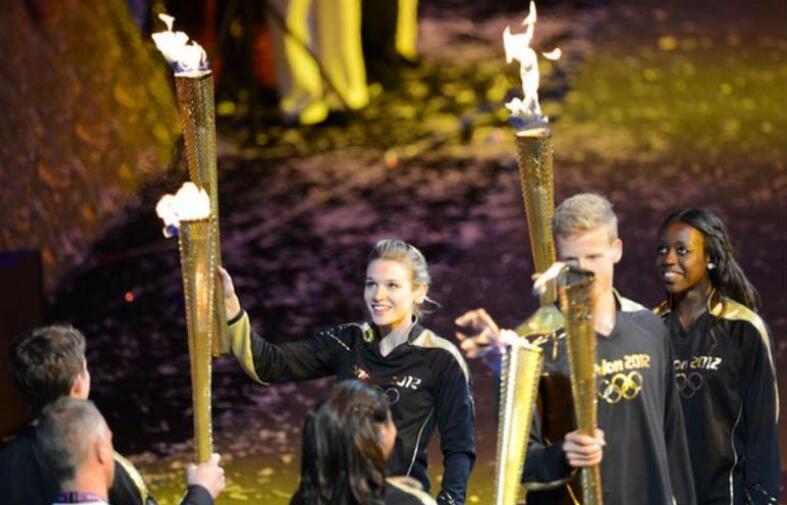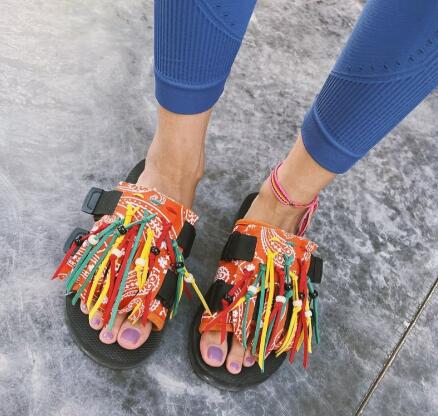Each of the seven teenagers spoke of a similar experience. An invite, heavy on gravitas, light on detail. A blacked-out taxi pulling up outside their door. A journey to east London and a freshly-finished Olympic Stadium.
They had been met by London 2012 officials, who were friendly, but not forthcoming. And then they were left alone.
Down a concrete corridor, in a bare room, they talked. Why them? What next?
“No-one had an answer,” remembers Desiree Henry, who at the time was a 16-year-old sprinting hopeful.
“We were all trying to figure out what we all do, asking each others’ ages, where we were from, what we did.
“We weren’t too sure what was going on.”
Henry recognised another youngster – Adelle Tracey – as a familiar face from the youth athletics scene.
The tallest of the seven revealed he had won a medal at the junior rowing world championships. One of the group was a national champion sailor. But another wasn’t an athlete at all. He led youth causes and volunteer groups.
What connected them? The answer arrived via a balding, spectacled man.
Danny Boyle strode into the room and introduced himself as the director of the London 2012 opening ceremony.
“He took the seven of us, linking arms, and literally huddled us up,” says Henry, now 26.
“He said he had an idea that we seven would light the Olympic cauldron. We were all astonished. I think I let out a massive gasp. He had to say it again: ‘I want you guys to light the cauldron.’
“We were all looking at each other; confused, shocked, excited and in total disbelief.”
Henry and the other six were only allowed to tell the one parent or carer who had accompanied them to that initial meeting.
When she travelled back home to Edmonton in north London later in the evening, Henry and her mum kept the afternoon’s event and Boyle’s plan from her dad and sisters. They might not have believed it anyway.
The lighting of the Olympic cauldron had always been a job reserved for A-listers.
Four years before, Li Ning, a three-time gold-medal-winning gymnast, ignited Beijing 2008.
Cathy Freeman set Sydney ablaze in 2000 before torching her way to a symbolic gold 10 days later. Muhammad Ali, his expression fixed, his arm faltering, had defied Parkinson’s disease to mark the start of Atlanta 1996.
Until London, that stark spotlight and heavy responsibility was borne by the shoulders of a single superstar.
Sir Steve Redgrave, Sir Roger Bannister, David Beckham, Bradley Wiggins, and the Queen featured in the pre-Games betting market. Speculation was rife, but none of it was right. No-one guessed that at London 2012 – whose tagline promised to ‘inspire a generation’ – the honour would instead fall to a group of unknowns.
A “save the surprise” campaign was launched to convince insiders to keep the ceremony’s contents under wraps. But, for the self-styled ‘secret seven’ there were a few more precautions.
“I was wondering if this was what it was like to be in the CIA!” says Henry.
“It was very undercover. The organisers were adamant about that. There were siblings, husbands and wives keeping secrets from each other.
“After Danny told us his plan there was a whole series of dress fittings and rehearsals at the stadium, we’d have to wait for them to clear it out to make sure we weren’t seen.”
Their cover was only meant to be blown in the most spectacular style.

There were 80,000 people in London’s Olympic Stadium on the evening of 27 July 2012, the air heavy with heat and expectation. In the UK, 27m people watched on TV. Around the world, 900m tuned in.
After the Queen’s ‘skydive’ with James Bond, after Mr Bean tapped out Chariots of Fire, after the nurses danced and Dizzee Rascal rapped, it was Henry’s moment.
With the house lights down and the soundtrack silenced, Redgrave, dressed in all white, jogged under a stand, through a guard of honour and into the arena.
Holding the flame aloft, he turned to face all sides of the stadium.
“It is a very proud moment for him,” purred commentator Barry Davies. “And a very proud moment for Britain.”
Then Redgrave turned to pass on the flame for the final time.
Cameron MacRitchie, a young rower chosen by Redgrave, took the torch and the seven started jogging around the stadium as a choir of schoolchildren sang.
Each of the seven took the flame for part of the lap. Then they each lit a torch of their own. And finally, together they lit the cauldron.
“The only thing I was anxious about was igniting the gas canister in my torch,” remembers Henry. “In rehearsals, I kept messing it up.
“If you watch it back, you can see the concentration in my face making sure the gas is open and my torch lights.”
Back home in the Henry family home in north London, things were less composed.
“My dad and sisters were in shock!” remembered Henry. “They were extremely happy and proud for me, but on the other hand they could not believe I had hidden such a big secret. I had to say it wasn’t my decision!
“My whole school, everyone around my area, they were all so shocked.
“I am from Edmonton. Not a lot of big things happen here, but for me to be involved in one of the biggest things ever filled everyone with a sense of unity and pride. It meant a lot to see one of their own on the big screen doing something so big.
“I remember looking out into the stadium and trying to embrace it. There was just darkness and loads of flashing lights from people’s camera phones. I felt like a rock star for the day.”
Henry’s fame has lasted longer than that.
Four years later, aged 20, she reached the 100m semi-finals at Rio 2016, and claimed an Olympic bronze as part of the 4x100m team.
Another 12 months on, she was back in front of a packed London Stadium for the World Championships of 2017, where she would win silver in the 4x100m relay.
“I was in the first heat of the women’s 100m and when they announced my name the whole stadium erupted,” she says.
“Those guys remembered me! It was like the people’s child had grown up, but is still doing athletics and is doing her best!”

New steps towards inspiring another next generation could be made on Thursday, when Birmingham’s refurbished and expanded Alexander Stadium hosts the Commonwealth Games’ opening ceremony.
“There is going to be a young kid in that crowd thinking to themselves: ‘I want to be there on the track,'” predicts Henry.
“Moments like that help make a future Olympian or Commonwealth medallist, especially when it is right there, not something they’re witnessing online or through a screen. They can live and breathe the atmosphere in person.”
Reality, though, has a habit of pinching in on legacy.
After the 2012 Olympics, UK Athletics signed a 50-year deal giving them the right to host events at London Stadium for one month each year.
In theory, a 67-year-old Henry could take her grandchildren along in 2063. In practice, her own athletics career might outlive the arrangement.
Reports earlier this year suggested UK Athletics would be offered a pay-off – worth about £15m – to surrender their rights to London Stadium.
The move would bring in funds but sell out a legacy, leaving the capital without a top-class facility to host athletics events.
Jessica Ennis-Hill, Dina Asher-Smith and Olympic champion-turned-World Athletics president Lord Coe have all expressed concern over any such move.
So has Henry.
“For me, it is impossible to imagine London without a top-class athletics stadium given the history of the London Olympics,” she says.
“Those Games were incredible, it unified so many different cultures and sports together.
“There is so much history in the stadium. It would be such a shame to be pushed aside and thought about as just something for the record books.”

The seven youngsters who lit the flame are all still in contact, sharing a group chat. Some are still in sport. Tracey is set to compete in the Commonwealths for Jamaica, having switched allegiances this year. But most are not. They have opted instead to pursue careers elsewhere.
Despite their divergent paths, they share a unifying experience. One they will enjoy again at a reunion hosted by the British Olympic Association on Wednesday as they mark the 10th anniversary of London 2012.
“This is a bond that nobody else can ever understand or explain,” Henry says.
“So many of us are doing so many different things, but we will always stay in contact.
“There is no way that any of them will manage to live life without me in it.”



